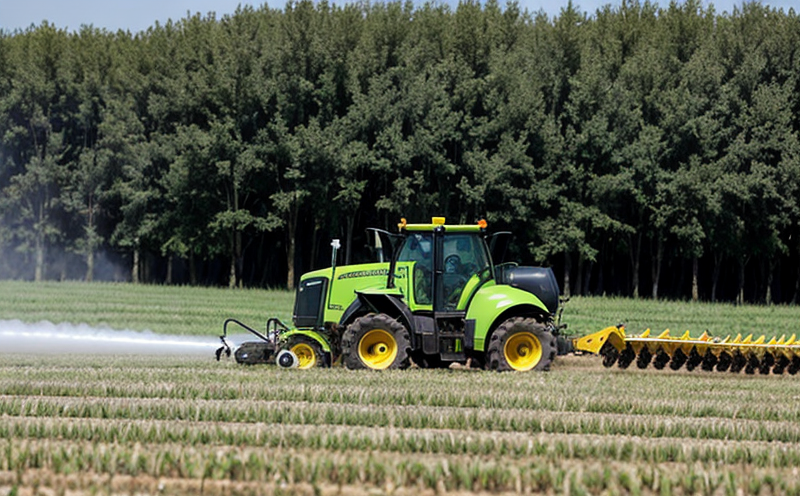Comprehensive Herbicide & Fungicide Multi-Residue Screening
In agricultural and forestry operations, ensuring food safety and environmental sustainability is paramount. The presence of herbicides and fungicides in crops can have significant implications for human health and the environment. Comprehensive multi-residue screening helps to identify not only the specific residues present but also ensures compliance with international standards like ISO 3696:1997 and EU Regulation (EC) No 396/2005.
Our service offers a robust approach tailored specifically for agricultural and forestry testing. Our state-of-the-art laboratory employs advanced instrumentation such as High Performance Liquid Chromatography (HPLC), Mass Spectrometry (MS), and Gas Chromatography-Mass Spectrometry (GC-MS) to perform precise multi-residue analysis. This method allows us to detect a wide range of herbicides and fungicides, ensuring that the results are accurate and reliable.
The process starts with thorough sample preparation which includes extraction techniques like QuEChERS or accelerated solvent extraction depending on the matrix type (plant tissue, soil, water). Post-extraction, our team ensures that samples are cleaned up to minimize interferences during analysis. Once prepared, they undergo rigorous chromatographic separation followed by detection using high-resolution mass spectrometry for accurate identification and quantification.
Our laboratory adheres strictly to internationally recognized standards such as ISO 3696:1997 which sets out the guidelines for chemical analysis of plant products, including those treated with pesticides. By adhering to these stringent protocols, we guarantee that our clients receive results that are both precise and legally defensible.
This service is particularly valuable in scenarios where multiple residues need to be detected simultaneously rather than individually testing each compound separately. This reduces time-to-result while ensuring comprehensive coverage of potential contaminants. It also helps clients comply with increasingly stringent regulatory requirements across various regions including the European Union, United States Environmental Protection Agency (EPA), and others.
For researchers in R&D departments within agricultural companies, this service provides critical data on residual levels which can inform product development decisions aimed at reducing harmful effects on non-target organisms. Procurement teams benefit from knowing exactly what they are getting so that they can make informed purchasing choices.
- Accurate and timely detection of multiple herbicide and fungicide residues in agricultural produce.
- Compliance with international standards for pesticide residue analysis.
- Rapid turnaround times to support decision-making processes in various industries.
- Precision instrumentation ensures reliable results every time.
In summary, our Comprehensive Herbicide & Fungicide Multi-Residue Screening service offers unparalleled precision and reliability when it comes to identifying pesticide residues in agricultural products. Whether you're a quality manager looking for assurance about the safety of your harvested crops or an R&D engineer seeking insights into potential improvements in crop protection practices, this service provides essential information needed for informed decision-making.
Why It Matters
The significance of herbicide and fungicide residue testing cannot be overstated. These chemicals play a crucial role in controlling weeds and diseases in crops, but their improper use can lead to adverse effects on human health and the environment. Proper monitoring ensures that these substances are used safely within prescribed limits.
From a public health perspective, excessive residues of these chemicals could pose risks if consumed directly or indirectly through contaminated water sources. Regulatory bodies worldwide have established maximum residue levels (MRLs) for different types of crops to protect consumers from potential hazards associated with pesticide exposure.
In terms of environmental impact, improper application methods can result in runoff into nearby streams and rivers, leading to contamination of aquatic ecosystems. This not only affects fish populations but also disrupts the entire food chain downstream. By conducting regular screenings, farmers and other stakeholders can adopt best practices that minimize these risks.
For businesses involved in export markets, compliance with international standards is non-negotiable. Failure to meet these requirements could lead to product rejection at ports of entry or even costly recalls once issues are discovered abroad. Our service ensures that all tests conducted adhere strictly to internationally recognized guidelines, thus safeguarding against such pitfalls.
Lastly, from an ethical standpoint, responsible use of agrochemicals contributes positively towards sustainable farming practices. By minimizing unnecessary applications and focusing on effective treatments only when necessary, we contribute to healthier soils and more resilient ecosystems.
Scope and Methodology
The scope of our Comprehensive Herbicide & Fungicide Multi-Residue Screening service encompasses a broad range of pesticides commonly used in agricultural settings. This includes but is not limited to glyphosate, paraquat, mancozeb, and others listed under relevant regulations.
Our methodology involves several key steps starting with sample collection which should ideally be representative of the entire batch being tested. After collection, samples are transported back to our laboratory where they undergo rigorous preparation procedures such as extraction using appropriate solvents followed by clean-up processes aimed at removing matrix components that might interfere with subsequent analyses.
Following this step, extracts are injected into HPLC or GC-MS instruments for separation and identification respectively. For quantification purposes, calibration curves are generated based on known concentrations of standards spiked into the same solvent system used during sample preparation. Results obtained are compared against reference materials whenever available to ensure accuracy.
Our team follows strict quality assurance procedures throughout this process ensuring that no step is overlooked or hurried. This commitment to excellence translates into consistent high-quality results every time. We also provide detailed reports outlining all findings along with recommendations for further action if needed by our clients.
Use Cases and Application Examples
Quality Assurance: Regular screenings help ensure consistent product quality by detecting any unwanted residues early in the process.
R&D Support: Researchers can use these data points to explore new formulations or improved application methods that reduce risk while maintaining efficacy.
Compliance Verification: Exporters need proof of compliance with importing country regulations. Our service provides this assurance through accurate and reliable results.
Farm Management: Farmers can adjust their practices based on residual levels detected, ensuring optimal crop health without overuse of chemicals.
These examples illustrate how our Comprehensive Herbicide & Fungicide Multi-Residue Screening service plays an integral role in maintaining food safety standards while promoting sustainable agricultural practices.





